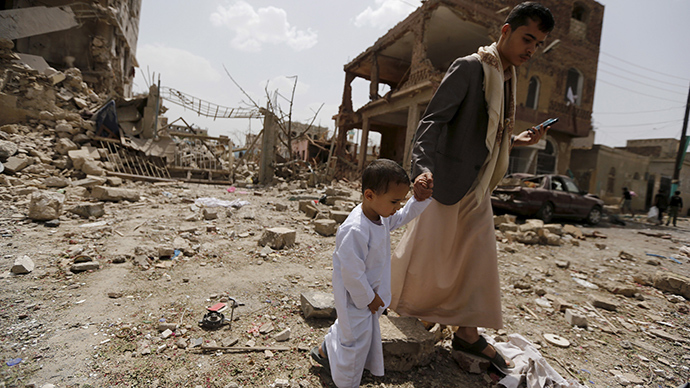Saudi airstrikes violate ‘unconditional humanitarian pause’ in Yemen

The second UN-brokered humanitarian pause in Yemen has been violated by Saudi-led air strikes less than an hour after the truce came into effect. According to reports at least three cities witnessed bombardment.
The airstrikes first hit the country’s third-largest city of Taiz, after a UN-declared truce kicked in after midnight Friday, official sources on the ground confirmed to Reuters and the Associated Press.
READ MORE: Collateral damage: Yemeni man loses 27 family members in 1 Saudi airstrike
Witnesses on the ground said that fighting engulfed the city prior to the bombardment, with both sides placing the blame for truce violation on each other. At least three airstrikes hit Houthi fighters positions in Taiz.
In Sana’a, a number of strikes were targeting the presidential residence in the city center, while in Aden a number of Houthi positions came under attack, a security source in the Aden Governorate told Sputnik early on Saturday.
Member of the Houthi rebels’ political council Hamza al-Husi told Sputnik that air-strikes began just 40 minutes after the start of the humanitarian pause.
Witnesses also reported that Saudi-led air strikes had increased across the country in the hours before the truce was to take effect.
The UN-declared truce began after midnight Friday and was meant to offer a humanitarian window of assistance for the conflict-torn country. It was scheduled to last through the end of the holy month of Ramadan which ends on July 17.
More than 3,000 people, mostly civilians have been killed since the coalition started their bombing campaign in March, aiming to get rid of anti-government Houthi rebels and restore the rule of the exiled Sunni President Abd-Rabbu Mansour Hadi.
READ MORE: Saudis resume airstrikes on Yemen following five-day humanitarian ceasefire
Yet despite Saudi intervention there has not been any significant progress, as Yemen’s army units, which are loyal to the country’s previous president and Houthi ally Ali Abdullah Saleh, are putting up a stiff fight.
The Saudi-imposed blockade of its neighbor and air campaign created a humanitarian catastrophe for Yemen, with UN warning that the Arab world’s poorest country is “one step” from famine.
According to UN more than 80 percent of Yemen’s roughly 25 million residents now require some form of aid. Another one million civilians were displaced by the conflict. The first humanitarian pause, advocated by Russia and the UN was allowed to take place for five days in May, but did not bring much relief as the air campaign continued shortly afterwards.












